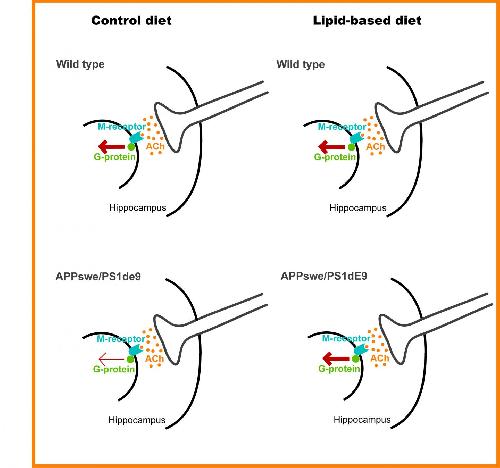Alzheimer´s disease (AD) is the most common disease underlying memory problems and dementia in the elderly. One of the invariable pathologies in AD is degeneration of cholinergic synapses in brain cortex and hippocampus. Despite enormous effort to find out an efficient treatment, current pharmacological interventions are limited to a few drugs that alleviate symptoms but do not slow down the underlying disease processes. These drugs include inhibitors of cholinesterases, enzymes that degrade the neurotransmitter acetylcholine, or memantine, a modulator of glutamate neurotransmission.
It is generally accepted that lifestyle and particularly dietary habits influence mental health, and prevalence and progression of AD. Numerous epidemiological studies have revealed profitable effects of dietary intake of especially fish oil on cognitive decline during aging and dementia.
Within the EU-funded project LipiDiDiet (FP7-211696, therapeutic and preventive impact of nutritional lipids on neuronal and cognitive performance in aging, Alzheimer´s disease and vascular dementia, researchers devised several lipid-based diets aimed at slowing down progression and relieving symptoms of AD. Short-term (3 weeks) feeding of young adult APPswe/PS1dE9 mice (transgenic mouse model of AD) with experimental diets containing fish oil or stigmasterol reversed the decrease in responsiveness of hippocampal muscarinic receptors to acetylcholine compared to their non-transgenic littermates. Only fish oil based diet enriched with nutrients supporting neuroprotection (Fortasyn diet) increased in addition the density of muscarinic receptors and cholinergic synapses in the hippocampus.

These findings yield important proof-of-principle evidence that regular intake of specific dietary components may help to prevent some of the key early functional changes that take place in the Alzheimer brain. These findings support viability of the dietary approach in AD.




Comments